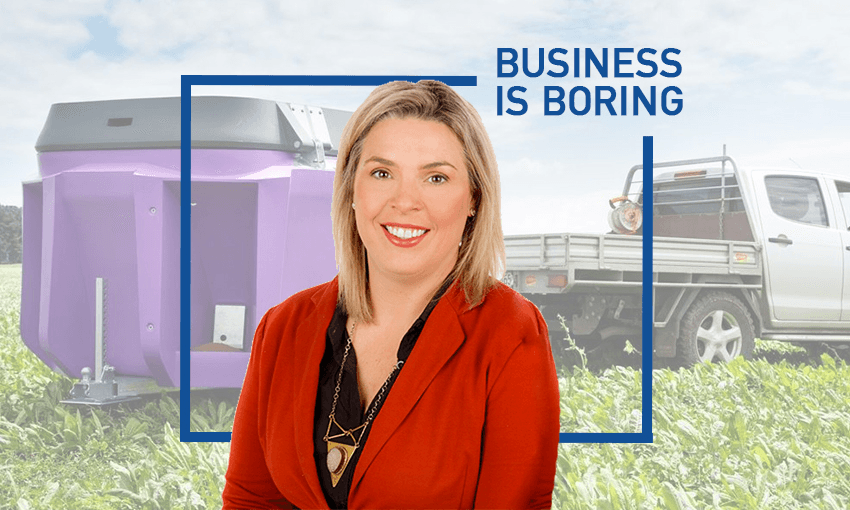Business is Boring is a weekly podcast series presented by The Spinoff in association with Callaghan Innovation. Host Simon Pound speaks with innovators and commentators focused on the future of New Zealand, with the interview available as both audio and a transcribed excerpt. This week he talks to Kate Gwilliam, CEO of feedstock solution Zeddy.
We all know we can’t simply put more animals onto land to grow the economy – we need better ways to maximise the returns from dairy and other animal farming practices. One person who knows this better than most of us (and is doing a lot more to help) is today’s guest Kate Gwilliam.
Kate moved from working as a project manager in Auckland to taking on a 450-strong cattle herd in Manawatu with her husband, Tom. Neither had a background in farming, but they managed to make their farm a tech-first endeavour, including full automation in the calf shed, farm sensors and computer-based reporting systems. And with this experience, Kate got involved with an automated feedstock solution, Zeddy, which uses RFID to deliver just the right amount of feed to every animal on the farm.
It’s award-winning tech and they’ll be sharing it at Fieldays, currently underway from the 12-15 June. To talk about the journey, what life is like on the farm, and how to use tech to make things better, Kate joins the podcast
Either download this episode (right click and save), have a listen below or via Spotify, subscribe through iTunes (RSS feed) or read on for a transcribed excerpt.
This idea of moving from an office job in Auckland to a dairy farm in the Manawatu – how does that happen?
Now that I think about it, it was very crazy at the time! But my husband, who’s a born a bred Aucklander, just came to me one day and said ‘I’m ready to move from Auckland. I’ve lived here my whole life!’ It took me a while to get used to that idea because I loved Auckland. But as we were talking about where we wanted to go and what we wanted to do, he said he’d really love to farm animals. So I sent him down to a family friend’s farm for a month to try it out and he came back and he said ‘I love it. I want to move. I want to do this.’ So we packed up our life, we sold our house, I left my job, and he sold his building business [before making] our way down to the Manawatu.
When we looked at where we wanted to go, we wanted to go somewhere where farming was the core of the community. I’m also originally from the Manawatu – my parents live down there – so that kind of felt like a natural progression. And as we thought about having children in the future, [we thought] it would be nice to be around some grandparents one day, so Manawatu was where we ended up.
Tom worked on the farm for a year and then we set about trying to buy a farm with my parents. That was interesting. We had a lot of false starts, but then we finally ended purchasing a farm.
So a year later we owned a dairy farm. We’d left the big city Auckland for the bright lights of rural New Zealand!
With the dairy industry being such a big force in the country’s imagination and economy, you must’ve had some preconceptions about what farming would be like. What was that transition like?
I was reasonably lucky. I knew what we were getting into because I grew up with a lot of friends who came from farming families. But we definitely [still had] preconceptions. I think we didn’t realise how much hard work it would be. I think we thought it would be a lot easier than it has been. It’s very much hard graft and my husband’s a real trooper.
But I think the biggest challenge was leaving behind our life in Auckland: our friends, our social life, our nice cafes, and ending up in rural New Zealand. But that’s been a really great thing. Now that we’ve got a young family, I wouldn’t have it any other way. Our children get to grow up on a farm, have pet animals, and they get to see how animals are reared and how nature works first hand. It’s a really cool experience.
One of the ways you’ve run the farm is to be super tech-first. Is that a rare thing or a common thing these days?
I think we’re more aggressive than the general farmer. When I look at dairy farming in New Zealand, I think we’ve got a bit of a slow uptake than maybe other countries with technology, especially if you compare automation to the UK or Europe, New Zealand is definitely a bit slower with the uptake of automation.
But how we really approached it is we started with one thing we wanted to improve. We saw we had some inefficiencies [because] we were rearing all these animals for four days and then they were going off to the works. I wanted to change that process – I didn’t think that was a great way to be sustainable and I also saw these animals as an asset. So we looked at rearing all of our calves but that was very laborious. So we thought: ‘How can we bring in technology to help us do this job?’
So now we rear all our animals on our home farm and we also operate another farm that’s not too far from us that has 400 cows. So we’re rearing about 800 calves [in total], all automated on our farm. That means we’re far more profitable, but it’s also a better for the farming community. I think there are a lot of ways farmers can add value to their farm by using technology.

